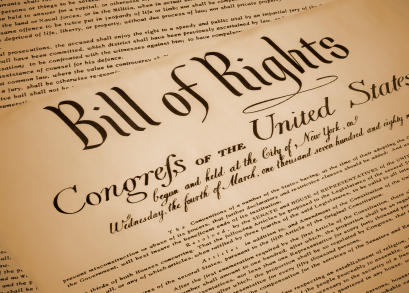American Illusion

By: Wayne Brown
(Writer’s Note: Hub writer, Harlan Colt, recently posed the question: “What is a right?” At first glance, I almost passed it by and did not offer my opinion then the more I thought about it, the more significant the question became. Soon, I too, was offering my two cents on the question and I was also convinced that far too many people do not understand the complexity of the concept of “right” in the American society. That said I would like to personally thank Mr. Colt for inspiring me to write this article.)
According to Merriam-Webster, a “right” refers to “being in accordance with what is just, good, and proper. The definition goes on to add “conforming to the facts and truth”. In the perspective from which this definition is offered, a “right” seems to be a good thing and it occurs on the good side of things, like truth and facts. While I think these statements are certainly relevant to describing a “right”, I think they fall miserably short of giving a clear picture of what a “right” is or is not to those who claim to possess them.
Let’s start by putting the concept into perspective using a business example. If I own a building and want to lease it out and you are in need of a building much like the one that I have, then we have the basis for a contract. I want to lease my property and you desire to lease it from me. If we simply shake hands on the deal and you start paying me rent, that would seem to some like a happy and simple arrangement. While the “simple” part is true, the agreement in principle is woefully lacking in terms of guarding the “rights” of the two parties involved. One could say that by striking such an arrangement that both parties just agreed to waive all rights that they might have other than the ownership granted by the deed.
This is why we have contracts. Contracts are binding agreements between two parties which spell out the “rights” that each party possess under the terms of the particular contract. In this example, the contract would be referred to as a “lease agreement” and both parties would sign it acknowledging their agreement and understanding of the terms of contract. Should, at some point, a dispute arise regarding the leased property, then the lease contract becomes the basis on which the courts will rule with regard to the “rights” of each particular individual involved in the contract. In this manner, each party, by virtue of the lease agreement, has some peace of mind that their “rights” are protected.
Now, let’s get to the sticky part that causes the confusion and leaves most people really not understanding the concept of “rights”. Going back to our example above, each parties “rights” are a function of the binding agreement reached by virtue of the contract which they signed. The rights are spelled out in terms of scope and limitations. There are also instructions under which a “cure” may be reached if “rights” are violated. What we must understand here is that our “rights” are protected as long as we are in accordance with the provisions or requirements of the contract. If I, as the tenant, elect to not pay my rent, eventually, under provisions spelled out in the agreement, I forfeit my “rights” under the contract to prevail as having legal access to the property. At that point, the landlord is within his/her legal “rights” to lock me out and prevent access. The key to understanding the concept of “rights” is very clearly exposed here…we must be in accordance in order to claim our rights.
Now, let’s take what we have learned from our business example and move into another arena of “rights” which comes from a different perspective. Under those documents created by our Founding Fathers in the United States, we have a “Bill of Rights” which essentially spells out those rights which will be protected and afforded to each and every legal citizen of the United States of America. The laws of our country will protect those rights in a court of law. The function of the Bill of Rights is to clearly spell out what those particular “rights” are as defined by our Founding Fathers and as agreed upon by our governmental bodies in this country.
What many people fail to recognize here is that we have a “contract”. In this case, we have a “contract of citizenship”. Within that contract, I, as an applicant for citizenship, agree that I will be bound by the laws of the United States of America and that I will uphold and defend that which is the United States of America. In general terms, that is what I am agreeing to by asking to be a citizen of the United States. I am agreeing to be bound by those terms. In turn, under the Bill of Rights and the Constitution, I am granted certain rights which I can exercise freely and those rights will be protected under the laws of the United States of America.
Just as we saw in the business example which I cited above, the “rights” which come with citizenship are also subject to some limitations. There is a stipulation in my contract which I agreed to in becoming a citizen. That stipulation is that I will comply with the requirements of citizenship. If I come here from another land, I must complete the steps for citizenship and then I must take an oath swearing my allegiance to the United States of America. If I am born here, then the contract automatically assumes that I am a citizen and that I am bound by the requirements of citizenship. Thus, regardless of which example I use, if I do not fulfill the requirements of citizenship, I essentially forfeit my “rights” as such.
We have all seen the criminal apprehended in the movies or on television. The law enforcement officers and others requiring information of this person are quick to read the person their “rights” as spelled out under the “Miranda Clause”. That requirement states that I, as the criminal suspect, have the “right” to remain silent and that anything that I say or do can be used to prosecute me in a court of law. It also says that I have the right to an attorney to advise me as to what I should or should not say in the course of the investigation of the crime. Here again, we have an agreement in principle that stipulates that the suspect can remain silent and wait for his attorney and the law enforcement personnel will recognize that right and leave him/her alone. Conversely, the terms also stipulate that the suspect may waive that right and freely discuss or answer any questions put forth by the law enforcement officials. In turn, this information can be used as evidence to convict the individual in a court of law. Both parties must understand and execute this agreement in each scenario. As you can clearly see, this agreement has stipulations, limitations, and requirements which hold both parties accountable if their “rights” are to be sustained.
In America today, we see too many scenarios in which individuals or groups are citing their “rights” to do particular things or have access to particular programs or processes under the guise of citizenship, yet they are not legal citizens of the United States of America. In effect, they have not executed the contract for claiming their rights because they have not completed the necessary legal requirements to be citizens. At the very least, they have no rights as citizens under the laws of this country. At the same time, by virtue of their presence here in this country, they are bound by the laws of the country which is a prerequisite for their temporary presence or visa. Are they deserving of humane treatment? Yes, that goes without saying as it is a fundamental premise of our American fabric that we treat people humanely. But, in a contractual sense, in the eyes of the law, and under the premise of our Founding Fathers and their guiding documents, these individuals have no rights relative to those granted with citizenship. In order to obtain those rights, they must first meet the eligibility for citizenship and make the commitment that comes with it. They must agree to a binding contract to achieve their “rights” as Americans. To do anything less violates that which the legal citizens of America have committed to and upheld.
We hear far too much talk about “rights” and far too little talk about “accountability”. When we enter into an agreement, we become accountable for those actions spelled out within the context of the agreement. When we mortgage a home, we take a gamble, a gamble that says that I am betting that the money I put into paying for this home will be returned to me in the form of an equity on my investment somewhere down the road when I decide to sell it. That agreement which we sign commits us to the mortgage and the debt that goes with it. It makes us accountable for it. It does not in any shape or form guarantee us the “right” to earn equity or to be protected from loss per chance that the housing market falls apart and values decrease. That is the part that we call the “gamble” and for that we are the ones who are accountable…not the bank, not the seller, not the realtor…us, the buyer. When that value heads into red ink and our payment remains the same, we are still accountable for the debt. Many feel that at that point it is their “right” to up and walk away even though they can still afford the mortgage payment. Things have not gone as expected; therefore it is my right to walk away. What a shame that we think that we are so clear on our rights in this case and yet not cognizant of our accountability.
Much of what is wrong with America today as a society stems from what I have talked about here. We have become a society that expects immediate gratification and to have a chicken in every pot we own when we want it. We have become a society that expects government to shield us against our losses when we make poor choices. We want the government to bail us out and give us another chance. We want the debt to be forgotten because it would be too great a deed for us to live up to what was initially promised by us when we made the contract. We were not fooled or lied to in the process. We gambled and lost. When that happens, you suck it up and you take your medicine. Instead, America has become a country overflowing with “quitters” who throw in the towel at the first sign of disappointment and scream for their rights while remaining totally silent with regard to their accountability. What a shameful thing we have become when we had so many great examples of honesty and hard work preceding us in this country. What a shame.
America will no doubt continue down this road that we are on because far too many people don’t even know where we are in this country. Slowly but surely our ever-growing federal government will take more and more rights away in trade for that mental security that Americans so desire; that safety net that is always there below to catch us. Then one day, we will wake up and the “rights” will be all gone. Our protection will be only as good as that hand shake I mentioned early on in the business example I offered above. There will no longer be any rights protected under the laws of America and the average citizen can and will be held accountable for whatever the government that was established to protect those rights deems necessary at the time. Ignorance is bliss as the old saying goes and it was never more true than it is in America today.
© Copyright WBrown2011. All Rights Reserved.










